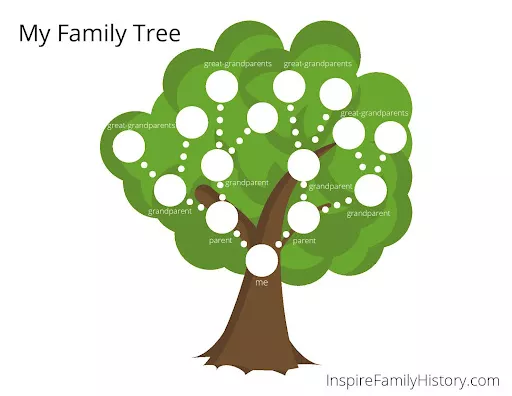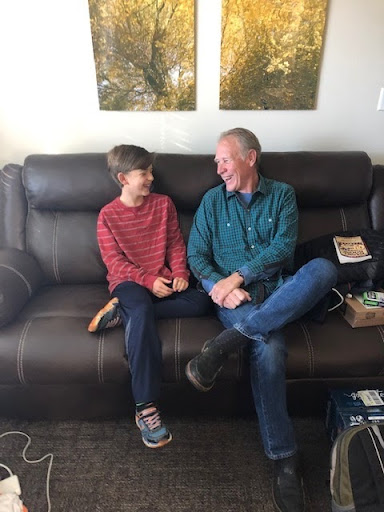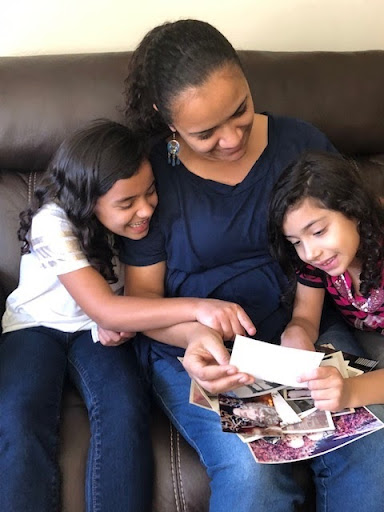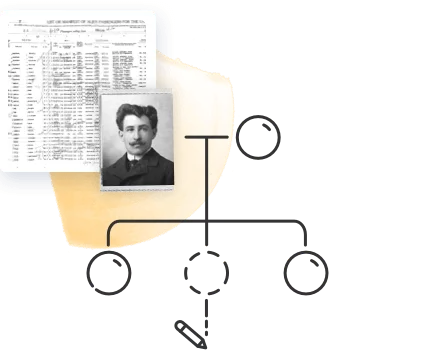
For children, genealogy can be just as incredible a way to find meaning and connect with living and deceased family members as it is for adults. Studies have shown that knowing your family history can benefit children in remarkable ways. These benefits include resilience, a sense of security, a strong sense of self-control, and a greater ability to moderate the effects of stress. Whether you are the parent, grandparent, teacher, or friend, you can help the children in your life experience these benefits.
Here are 5 ideas of activities that can help engage your kids. All of these ideas can be modified or altered to suit their ages and learning styles.
1. Interview Relatives
“A life that is not documented is a life that within a generation or two will largely be lost to memory.” (Dennis Neuenschwander)
Interviewing relatives will help future generations remember and learn from the stories of our loved ones. Time spent interviewing grandparents or any family member is a beautiful and bonding experience that will create cherished memories for everyone involved.
When you involve children in the interviewing process, you will help them connect with their relatives and create memories that will last their entire lives. Let your child guide the process as much as possible. Here are some suggestions for helping your children interview their relatives:
- Ask them which grandparent or family member they want to interview. You may suggest beginning with the oldest family member or the grandparent they are closest to.
- Help the child make a list of questions they want to ask and are curious about. Your child’s interests can guide the questions. If your child loves animals, ask the grandparent about the pets they have had throughout their life or encounters they have had with animals. If your child is interested in cooking, they can ask about family recipes or memories associated with food. To keep it simple for young children, they can ask about their grandparents favorite things (What is your favorite food, book, ice cream, song, etc?) This helps them to see what “favorite things” they have in common and how they are different. Some children might like to have the questions written on cards or on a list to use during the interview.
- Decide how to record the interview. If your child can’t write yet, they can draw the answer that their grandparents give while you do an audio recording. Older children can video record the interview and turn it into a film, or turn the answers into a book that can be shared with family members.
- Determine the length of the interview. For young children, interviews can be as short as one or two questions. Older children can usually stay focused for 30 minutes to 1 hour. It is important to be flexible and ask how long the person being interviewed is able or willing to continue. If your child still has questions to ask after the allotted time, set a time for a follow-up interview. For more details on how to interview relatives, see this article: How to Interview Your Relatives.
2. Create a Family Tree
Creating a family tree can help children visually understand that they are part of something greater than themselves.
- For children aged 6 and under, create a 3-generation chart in the form of a tree similar to this one:

Click here to access this downloadable image.
- Children aged 7–12 might enjoy a colored fan chart with a few more generations. The colors allow them to follow the family lines.
- Older children might enjoy a pedigree chart that has more information, such as places and dates of birth, death, and marriage. The information they see or fill in on their pedigree chart will likely pique their curiosity and inspire them to dig deeper and learn more.
When completed, display the tree somewhere they will see it regularly, such as their room. Seeing their family tree will help them piece together the pieces of the generational puzzle. The tree provides children with a visual image that allows them to see many of their ancestors in one place and visualize how they are connected. MyHeritage makes it easy to print a family tree chart — read this article to learn how: How to Create a Family Tree Chart or Book on MyHeritage.
3. Solve a Mystery
Kids can become detectives when you present them with a family history mystery. They will use their critical thinking and problem-solving skills to make discoveries about their family. The object of the quest might involve finding an ancestor’s parents’ names, occupation, or date of birth, death or marriage. It may be helpful to give the child a mystery that you have already solved so you can guide them through the process and ensure that they can succeed and feel the excitement of solving the puzzle.
MyHeritage provides Smart Matches™ with your family tree, which allow you to find other people who have the same ancestor and gather information from other family trees. The owners of these other trees may have additional information that you do not have. Kids can also look through Record Matches, which suggest historical records that may mention your ancestors. Together you can decide if you think the person in the record or family tree profile is the right person, and if it is, you can add the information to your tree. MyHeritage has more than 12 billion historical records to search. Smart Matches™, Record Matches, and searching the available records can help kids solve family mysteries.
4. Plan a Family Reunion
Family reunions forge and strengthen family bonds and give family members an opportunity to share memories and stories. Kids can meet new family members and get to know those they don’t see often. A family reunion can be as simple as a family Zoom meetup, or as elaborate as an extended trip to a place where other family members live. It’s important to remember that family reunions aren’t just for the adults. Plan activities that will get the kids engaged and help them connect with family members and ancestors. Playing games is a great way to get them involved and curious about their family history.
Some great games include:
- Family Bingo: Place names and/or faces of family members or ancestors on the bingo board
- Create a Skit: Turn a family story into a skit that can be performed and recorded to watch later and share with family
- Dress Up: Dress up in old-fashioned clothes and take fun photos
Tailor the games and activities to the ages and interests of the children involved.
5. Photo Hunt
Kids can ask family members (grandparents, grandparents’ siblings, parents, aunts and uncles, cousins) what family photos they have. The more people they ask, the more they will find. Ask for physical or digital copies.
MyHeritage’s Photo Discoveries™ feature also makes it possible to find family photos you may never have seen before that were uploaded to the site by a distant relative. Photo Discoveries™ are part of the Instant Discoveries™ feature.
When kids come across black and white photos, they can use MyHeritage In Color™, MyHeritage’s automatic colorization tool, to colorize the photos. When color is added to a black and white photograph, it brings the photo to life and makes the subjects of the image feel more real and present. Kids also may notice details that were difficult to see when the photo was black and white.
Exploring family history with your kids is not just a fun and rewarding activity for the whole family. You’ll be giving your children the priceless gift of knowing more about where they come from, which, in time, they will be able to pass on to their own children.







